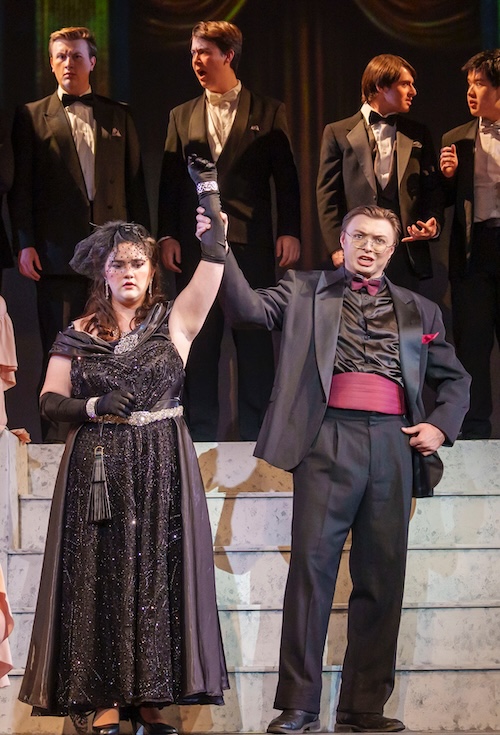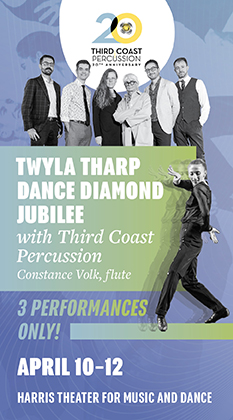Uneven singing, dismal direction make for an unhappy “Merry Widow”

Northwestern Opera Theater’s productions are often good opportunities to spy rising talent among the student singers. Thursday night’s production of Léhar’s The Merry Widow at Cahn Auditorium offered some of those chances. But the production was sorely let down by someone outside of the Northwestern orbit: director Jen Pitt, who also wrote the new English dialogue. (The songs were still sung in German.)
Act Two featured her only two inspired decisions: having Hanna and Danilo splash around in a pool during their duet, and having them review old photos of themselves during the famous “Merry Widow Waltz.” (These were real photos of the two singers, projected onstage.) These moments gave a nice depth to their backstory.
As for the rest of the production, someone forgot to tell Pitt that romantic comedy is supposed to be romantic and comedic.
The secondary couple, Valencienne and Camille, should be constantly flirting with each other. Instead, Pitt had them play every scene like it was a breakup in a soap opera.
Pitt didn’t update the jokes. She simply removed most of them, while having the characters constantly snigger at each other, as if someone had said something funny. The singers were frequently the only people laughing in the auditorium.
Some of her changes also made no logical sense. The scene where Hanna admits that Danilo has worn down her resistance through his dancing? Except he wasn’t dancing. The scene where Zeta spots his wife cheating on him, only for Njegus to switch her with Hanna? Pitt had them switch before Zeta supposedly spots her. The incriminating fan that destroys Njegus’s plan to cover up Valencienne’s infidelity? Pitt has Njegus himself give it to Zeta, undoing all of his work.
Two talented singers helped to overcome the show’s poor direction.
One was the evening’s shining light: baritone Spencer Greene as Danilo, the best actor and singer in the crew. His physicality captured all of the character’s different moods: drunken, roguish, bashful, and outraged. But more importantly, his voice flexibly adapted to expressing all of this. He had the needed security across his vocal range that allows one to make interpretive decisions rather than just focusing on hitting the notes. This young singer clearly has a good career ahead of him.

The other was Julia Frodyma as Valencienne. The production turned the character into a frosty harridan, thus robbing the soprano of the chance to play her with any of the usual charm. But Frodyma’s phrasing was consistently musical and her clear timbre cut through the textures nicely.
In the title role, Katherine Fisfis was largely inaudible for the first act and a half, unable to project above the orchestra or the chorus. Her big moment with “Vilja” showed some deficiency of breath control as well. But she warmed up starting in the second part of Act Two, inhabiting her character a bit more.
Tenor Alec Fore phrased tenderly in Camille’s love music. However, his top notes (high C’s, particularly) aren’t ready for primetime yet.
As Baron Zeta, Andrew Garratt’s rich timbre and earnest delivery in his singing were at odds with the buffoon he was supposed to be playing, but should serve him well in more serious fare.
Even though most of Njegus’s best lines were inexplicably cut from the dialogue, Will Schindler still provided highly effective comic relief.
Jana Anderson’s costumes made the most of the performers’ youth by having most of the men strut around bare-chested in swimming trunks in the second act.
Even when the onstage antics were out of step with the piece’s style and the music, conductor Patrick Furrer’s direction remained idiomatic. Léhar’s springy melodies and colorful but thick orchestrations call for flexible tempi and a light touch. Furrer knew how to consistently provide both.
The Merry Widow will repeat with the same cast Saturday and a different cast Friday and Sunday. music.northwestern.edu

Posted in Performances



